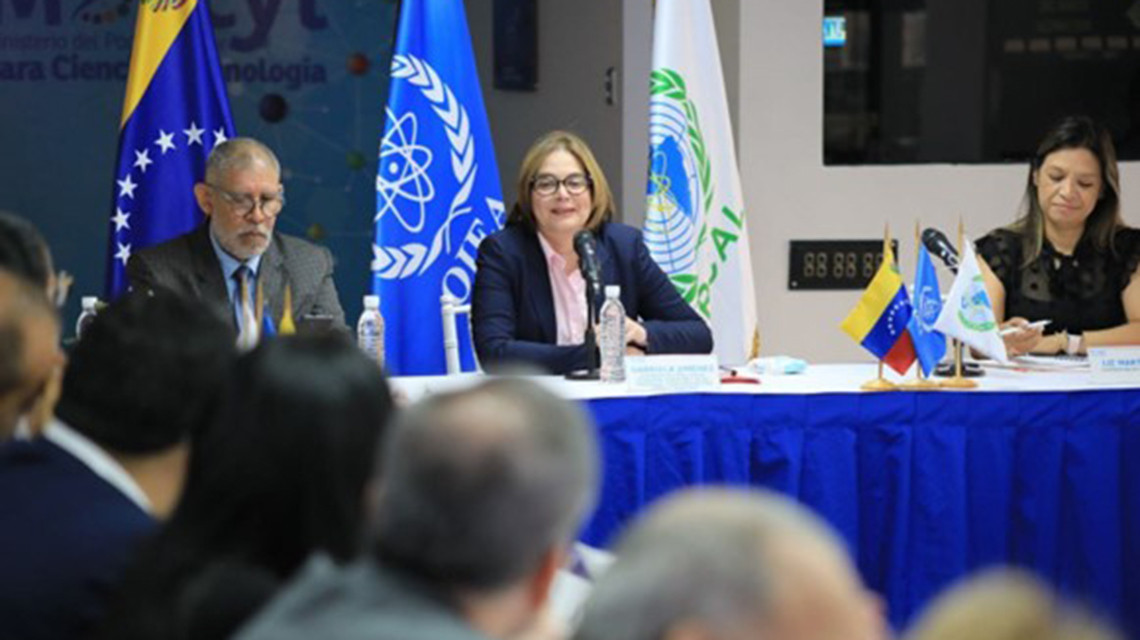In Venezuela, cancer ranks as the second leading cause of death by disease after cardiovascular diseases. A 2020 study conducted by the Venezuelan Anti-Cancer Society indicates an increase of cancer mortalities, up 17 per cent since 2014. Last year, the International Agency for Research on Cancer (IARC) estimated that over 50 000 new cancer cases were reported in Venezuela and has forecast it to increase by 71 per cent by 2040. In particular, breast, cervix and prostate cancers and kidney tumors remain the most common malignancies in the country, both for incidence and mortality.
A team of 12 IAEA, IARC and WHO cancer control experts were in Venezuela between 22 - 27 May to conduct an imPACT Review at the request of the Venezuelan Vice-Presidency for Science, Technology, Education and Health. The mission encompassed meetings with around 300 health professionals in both the public and private cancer services and visits to 17 medical and research facilities in the country. It has provided an opportunity to assess-working closely with national stakeholders-the challenges and opportunities in cancer care planning, financing, early detection, diagnostic and treatment, as well as on the safety of radiation sources in medical uses.
"There are currently two priority objectives within the Venezuelan health system: immunization and the recovery of the national cancer programme," explained Gabriela Jiménez Ramírez, Sectoral Vice President for Science, Technology, Education and Health (CITES). "Moreover, among the Government's initiatives to strengthen the oncology area is the pilot phase of the National Cancer System, which will be responsible for registering cancer patients and monitoring cases in Venezuela, in order to provide rapid and timely care to each patient according to their locality."

At the outset of the in-country mission to Venezuela, the imPACT Review team was welcomed by Gabriela Jiménez Ramírez, Sectoral Vice President for Science, Technology, Education and Health and Minister of Science and Technology. (Photo: MINCYT)
The interviews and visits conducted during the mission revealed that of the 60 public hospitals that offer cancer care services in Venezuela, many of them lack equipment, maintenance services and the human resources needed to operate effectively and at full capacity. Moreover, according to the Sectoral Vice-Presidency for CITES, the situation of radiotherapy is one of emergency, with more than 80 per cent of the 23 linear accelerators (LINACs) for cancer treatment in public sector hospitals currently non-operational. Tackling the needs of the 25 000 oncological patients who require radiotherapy each year is an immense task. Gaps in timely diagnosis and access to treatment are widening, negatively affecting cancer incidence and mortality.
The preliminary imPACT Review recommendations will enable the national authorities to set up a roadmap for cancer control, including actions to strengthen mechanisms for the collection and systematization of cancer data; development of diagnostic radiology capacities for screening and staging services for cancer patients; accelerating the introduction of a one-dose HPV vaccine in girls; and updating existing protocols for the prevention and early detection of cancer.
"The imPACT mission was essential to provide the Government with a baseline and the necessary elements to reorganize the National Cancer Programme, and to ensure synergy among the United Nations agencies operating in the country along the cancer continuum," said Cristian Morales, the country representative of the Pan American Health Organization (PAHO/WHO) in Venezuela.
Meanwhile the technical cooperation of the three agencies-IAEA, WHO and IARC-is already providing support to reestablish cancer prevention and control capacities.
With the support of the IAEA's technical cooperation (TC) programme, Venezuela is working to establish its first ocular brachytherapy service to treat patients with ocular cancer1/. The country is also participating actively with the IAEA's TC programme and with regional initiatives led by other international organizations, all of which aim to build capacities related to nuclear medicine, radiotherapy and medical physics. The findings of the imPACT mission will feed into a new national project proposed for the upcoming 2024-2025 IAEA technical cooperation cycle, which aims to strengthen the capacities and quality of radiotherapy, radio diagnostic and nuclear medicine services.






